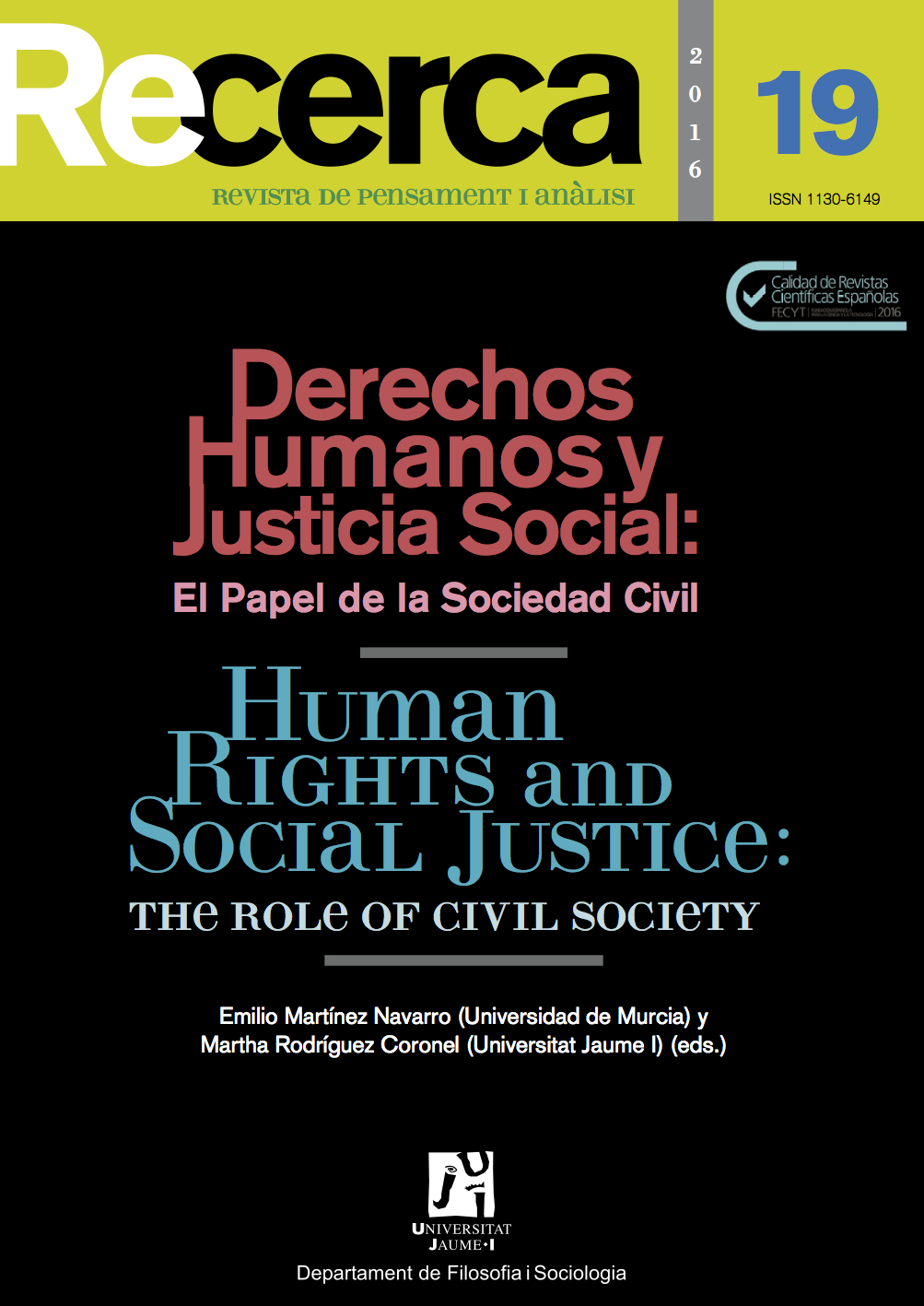La pobreza extrema como una violación de los derechos humanos. La respuesta de la justicia global frente a la beneficencia
Contenido principal del artículo
Resumen
En este artículo consideramos la pobreza extrema como un caso de violación de los derechos humanos en tanto que la situación de las personas que la padecen vulnera el mínimo de dignidad o justicia que permitiría reconocerlos como seres valiosos. La respuesta internacional en esos casos no puede entenderse como una cuestión de beneficencia sino que debe ir orientada prioritariamente con medidas de justicia que busquen el reconocimiento de la dignidad y las libertades de esas personas. En este sentido consideramos la posibilidad de defender una propuesta de justicia global distributiva como la de Thomas Pogge y, por otra parte, reconocemos el valor de los derechos humanos como imperativos éticos globales para la fundamentación y la defensa de una justicia global desde el enfoque de la capacidad de Amartya Sen.
In this article we consider extreme poverty as a case of violation of human rights as the situation of people who suffer it do not have the minimum of dignity or justice that would recognize them as valuable beings. The international response in such cases cannot be understood as a matter of charity but should be oriented primarily with justice measures seeking the recognition of the dignity and freedoms of those people. In this regard we consider the possibility of presenting a proposal for distributive global justice as Thomas Pogge does and, on the other hand, we recognize the value of human rights as global ethical imperatives for foundation and defense of a proposal of global justice from the perspective of the capability approach by Amartya Sen.
Descargas
Detalles del artículo
Citas
Brooks, T. (2008), The Global Justice Reader, Oxford, Blackwell Publishing.
Cavallero, E. (2006), «An immigration-pressure model of global distributive justice», Politics, Philosophy and Economics, London, Sage Publications, pp. 97-127.
Chen, S. y Ravallion, M. (2008), «The developing world is poorer than we thought, but no less successful in the fight against poverty», Developing Research Group Bank.
Cortina, A. (2007): Ética de la razón cordial. Educar en la ciudadanía en el siglo xxi, Oviedo, Ediciones Nobel.
— (2010): Justicia Cordial, Madrid, Trotta.
Crocker, D. (2008): Ethics of Global Development: Agency, Capability, and Deliberative Democracy, Cambridge, cup.
Macintyre, A. (1987): Tras la virtud, Barcelona, Crítica.
Nagel, T. (2005): «The Problem of Global Justice», Philosophy and Public Affairs, 33, no. 2, pp. 113-147.
Nussbaum, M. (2006): Frontiers of Justice. Disability, Nationality, Species Membership, Cambridge, Massachusetts, The Belknap Press of Harvard University Press.
Pereira, G., (2006): «Una fundamentación universalista para una lista de capacidades requerida por una justicia global», Diánoia, 57, pp. 79-102.
Pogge, T., (1994): «An Egalitarian Law of Peoples», Philosophy and Public Affairs, 23, 3. Princeton, Princeton University Press, pp. 192-224.
— (2002a): La pobreza en el mundo y los derechos humanos, Barcelona, Paidós.
— (2002b): «Moral Universalism and Global Economic Justice», Politics, Philosophy and Economics, vol. 1, 1, London, Sage, pp. 29-58.
— (2003): «Assisting the global poor» en D. Chatterjee (comp.) (2004): The Ethics of Assistance. Morality and the Distant Needy, Cambridge, cup.
— (2005): «Real World Justice», The Journal of Ethics, Princeton, Princeton University Press, pp. 1-7.
— (2009): Hacer justicia a la humanidad, México, Fce.
Rawls, J. (2001): El derecho de gentes y «una revisión de la idea de razón pública», Barcelona, Paidós.
Sen, A. (1982): «Rigths and Agency», Philosophy and Public Affairs, 11, pp. 3-39.
— (1996): «Legal Rights and Moral Rigths: Old Questions and New Problems», Ratio Juris, June 9, pp. 153-167.
— (1999), «Global Justice. Beyond International Equity» en Kaul, I. y otros (ed.) (1999): Global Public Goods. International Cooperation in the 21st Century, Oxford, oup.
— (2000): Desarrollo y libertad, Barcelona, Planeta, 2000.
— (2002), «Justice across Borders» en Degreiff, P. y Cronin, C. (ed.) (2002): Global Justice and Transnational Politics. Essays on the Moral ans Politicial Challenges of Globalization, Cambridge, Mass., The mit Press.
— (2004): «Elements of a Theory of Human Rights», Philosophy and Public Affairs, 32, pp. 315- 356.
— (2005): «Human Rights and Capabilities», Journal of Human Development, vol. 6, 2, pp. 151-166.
— (2006), Identity and Violence. The Illusion of Destiny, London, New York, Norton and Company.
— (2009), The Idea of Justice, Cambridge/Mass., The Belknap Press of Harvard University Press.
Singer, P. (1972): «Famine, Affluence and Morality», Philosophy and Public Affairs, 1, en Beitz, C. y otros (eds.) (1985): International Ethics. A Philosophy and Public Affairs Reader, Princeton, Princeton University Press.


